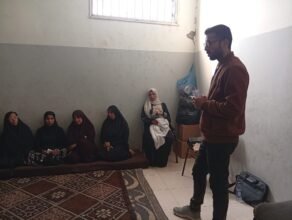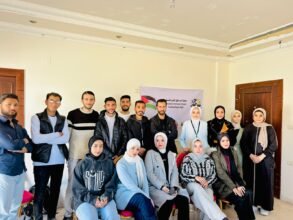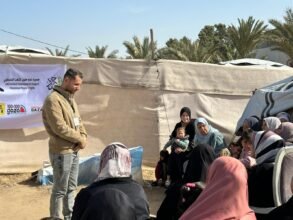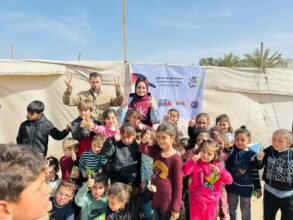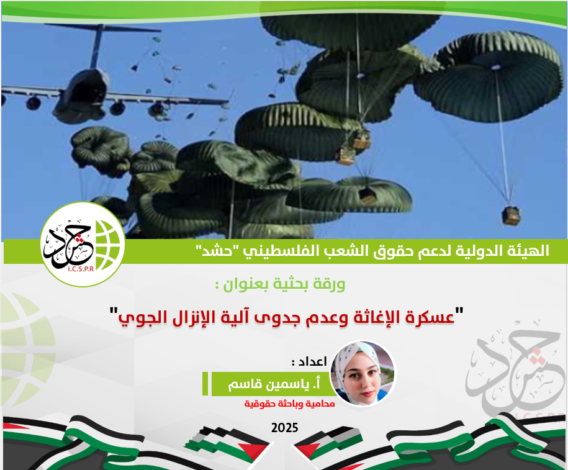
ICSPR Issues Research Paper Entitled: “Militarization of Relief and the Futility of Airdrop Mechanisms”
Date: August 27, 2025
Press Release
ICSPR Issues Research Paper Entitled: “Militarization of Relief and the Futility of Airdrop Mechanisms” Prepared by Researcher Yasmine Qasem
Gaza – The International Commission to Support Palestinian Rights (ICSPR) has issued a new research paper by researcher Yasmine Qasem, entitled: “Militarization of Relief and the Futility of Airdrop Mechanisms.” The paper addresses the humanitarian, legal, and political dimensions of Israel’s use of starvation as a weapon of war, in addition to examining the phenomenon of humanitarian aid airdrops, which the study describes as an ineffective mechanism that fails to meet the needs of Gaza’s devastated population. Instead, it has turned into a tool of media deception, used to cover up the international community’s failure to fulfill its legal and moral responsibilities.
The paper comes in the context of the ongoing genocidal war against Gaza since October 7, 2023, which to date has claimed more than 62,000 lives, including nearly 19,000 children and 12,000 women, alongside over 157,000 injuries. It has also caused widespread destruction of infrastructure and the forced displacement of nearly two million people. Researcher Qasem stressed that the catastrophic humanitarian reality in Gaza reveals that Israel has not only resorted to direct bombardment, but also to a policy of “engineered starvation,” amid a suffocating land, sea, and air blockade. This has left the population facing the grim choice between quick death under bombardment or slow death due to hunger, thirst, and disease.
Objectives and Methodology of the Paper
The study’s primary objective is to highlight the dangers of militarizing relief efforts and to critically examine the airdrop mechanisms that have been promoted as a humanitarian option. In reality, however, they amount to nothing more than “cosmetic solutions” that fail to address the catastrophe and instead reinforce collective punishment. The researcher relied on documentation and monitoring of Israeli violations against civilians and relief operations, as well as a review of human rights reports, UN statements, and field statistics.
Main Chapters of the Paper
The paper is divided into eight main chapters:
-
A comprehensive overview of the humanitarian situation in Gaza under genocide, linked to the Global Hunger Index and its progression toward the “catastrophe/famine” stage.
-
A chronological review of Israel’s starvation policies and the collapse of humanitarian access, leading to the option of airdrops.
-
An analysis of the history, methods, and technologies of airdrop mechanisms, with a focus on their impact in Gaza.
-
A comparison between the effectiveness of aid delivered through land crossings and that delivered via airdrops.
-
Statistical analysis of the volume of aid transported by land versus that dropped by air since the beginning of the war.
-
Examination of Israel’s objectives in militarizing relief and controlling aid distribution mechanisms.
-
An overview of Palestinian and international positions on the policy of aid airdrops.
-
Practical alternatives and urgent rescue plans, including recommendations and key findings of the paper.
Key Findings
The paper stresses that Israel’s policy of systematic starvation constitutes a crime of genocide under international law, and a blatant violation of the Geneva Conventions and the Rome Statute. It also demonstrates that airdrop operations have failed to meet even the most basic needs of the population, serving only as media spectacles with no tangible impact. The daily needs of Gaza exceed 600 aid trucks, while what is dropped by air covers less than 1% of those requirements.
The paper further notes that Israel has deliberately targeted aid distribution centers and massacred civilians gathered there, turning relief sites into “death traps.” These attacks have resulted in the killing of nearly 2,000 civilians and the injury of tens of thousands.
The paper concludes that the only realistic alternative is the full and safe reopening of land crossings under international supervision, ensuring the regular and unimpeded entry of aid, alongside an immediate halt to the genocidal war and accountability for Israel before the International Criminal Court. It also stresses that the international community must move beyond statements and condemnations to take serious action toward enforcing international protection for the Palestinian people and safeguarding their rights to food, medicine, and a dignified life.


